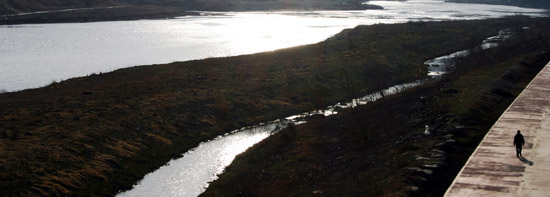The Controversy
over Canal Projects in Korea
By Cheon Deuk-yeom, Professor, Ex-Director of Yeongsan River Research Institute
A canal is an artificial waterway constructed by digging in land, and used for water supply and transportation. All around the world, canals have been constructed and in use since before Christ. However, due to the development of ground transportation, the role of a canal has dwindled and so have canal constructions. Examples of such canals include one connecting seas, the Suez Canal, and ones constructed along rivers, the Illinois Waterway in the United States, RMD Canal in Germany, and Jinghang Canal in China.
The reason why such canals have suddenly come to our attention is that the canal project was an issue during the recent presidential election. There has been strong debate after the presidential transition committee announced that it will enforce the canal project. A particularly heated debate has emerged over the government's plans to construct the Yeongsan River Canal as well as the Gyeongbu Canal connecting Seoul and Busan through a waterway.
Generally speaking, to make water transport as a possible substitute for cars or trains, canals should be created by digging up existing rivers in terms of width and depth. However, in some cases, we must build dams, lock gates, or tunnels to overcome the difference between depths of water where the river slope is steep. These cases generally require complex construction methods, a longer construction period, and result in higher construction costs.
The Gyeongbu Canal (proposed to be 553 km long from Busan to Incheon via Seoul) will be a huge public work project requiring construction of sixteen dams, seventeen lock gates, and one tunnel. The project is expected to cost 15 trillion won and require a minimum of five years to complete. Due to its significance and the risks involved, there has been a great deal of debate over whether the decision to go ahead with the project is the right one. Public consensus in support of the project is required in such a case, rather than an arbitrary political decision by the President.
Those in favor of the project argue that it will enable job creation, balanced land development, transport cost savings, procurement of water sources, and overall development of the tourism industry. The argument against the project has been that it requires high construction and operating costs, it may be harmful to the environment, it lowers economical efficiency, and its benefits are not verified.
In addition, although rainfall is expected to be regularly distributed throughout the year as part of the operation of a canal, in Korean summer monsoon seasons, a canal is highly vulnerable to flooding. There is also no concrete plan to raise the necessary funds for this project. While the transition committee's intent was to raise capital through earnings from aggregates sold through the canal construction, the exact construction costs have not been verified.
In the meantime, the construction of the Yeongsan Grand Canal proposed by Jeollanam-do along the Yeongsan River, a source of life in our region and a birth place of ancient culture, has also met with great opposition and cries of worry. The Yeongsan Grand Canal project involves restoration of an old waterway and improvement of the quality of water in the Yeongsan River, and establishment of a historic and cultural tourist site, linked with the new government's Honam Canal project. Plans for the project call on the development of a new era of the Yeongsan River by expanding ongoing the Yeongsan River waterway restoration projects and constructing an environmentally friendly Honam Canal, developing its cultural attractiveness for tourists. The kernel of the project is to restore the waterway by dredging the Yeongsan river 60-70 m and 6 m along the width and depth of the water surface, respectively, all along the 83.5 km length of the river from its bank to its mouth at Gwangsin Grand Bridge in the City of Gwangju.
Civic groups of the Gwangju and Jeonnam region have opposed the construction of Honam Canal along the Yeongsan River. Their argument is that the Canal is an inefficient, time consuming means of transportation because cargo volume between Gwangju and Mokpo is scarce, the service distance is short, and water transportation takes six times longer than ground transport. In addition, it is anticipated that the ecosystem of the river will be negatively affected, and the water quality will diminish rather than improve due to the project's impact on the river's ability to self-purify. Also expected to be lost are the archaeological remains scattered around the river.
Under the given circumstances, canal construction is inadequate in a peninsular country like Korea. Plans for the Grand Canal Project, which will impact the entire country, should be thoroughly reappraised from scratch. The inherent ecological value of a river should be considered as part of any plan. A river must function as a source of life rather than a means of traffic. Accordingly, the Yeongsan River should be treated, through research and proper verification, as a resting place for providing the people with repose. 

